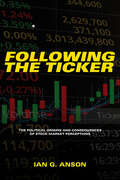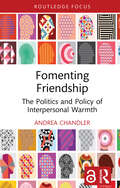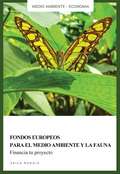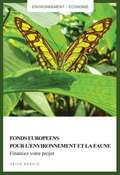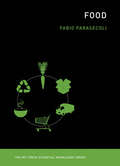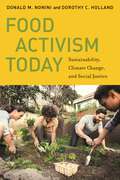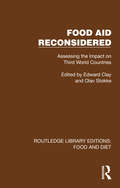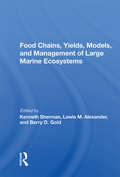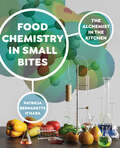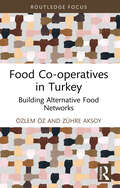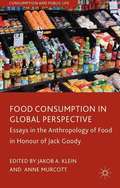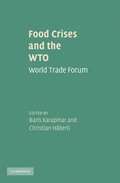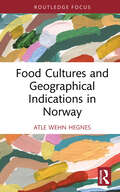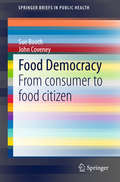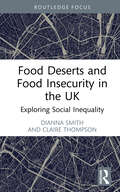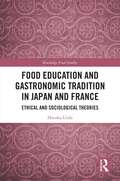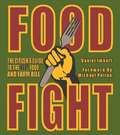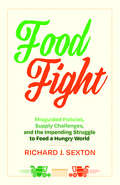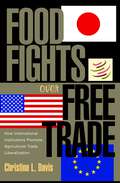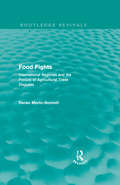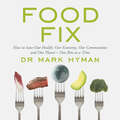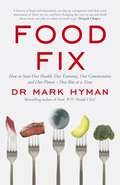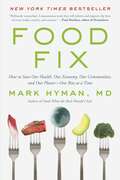- Table View
- List View
Following the Ticker: The Political Origins and Consequences of Stock Market Perceptions
by Ian G. AnsonDrawing on a wide variety of empirical methodologies, including large-scale survey analysis, survey experiments, and content analyses, Following the Ticker explores the complex relationship between stock market performance and political judgments through distinctive patterns of coverage in American news media. Building an eclectic theory that explores the interplay between media agenda-setting and partisan motivated reasoning, author Ian G. Anson helps to explain why the stock market increasingly occupies the minds of Americans when they evaluate the performance of incumbent presidents. In doing so, Following the Ticker contributes to a growing literature exploring the links between public opinion and economic inequality in American society. Because "the stock market is not the economy," the increasing salience of the stock market as a source of political judgments reflects a worrying development for classic models of democratic accountability.
Folter in Diktaturen und Demokratien: Eine Untersuchung von Funktions- und Wirkungsweise von Folter in politischen Systemen
by Linda WimmerDie vorliegende Arbeit analysiert die mögliche Funktions- und Wirkungsweise von Folter in politischen Systemen und geht vor dem Hintergrund des de facto Verbots der Folter im Völkerrecht der Frage nach, welchen Zweck die Folter im 21. Jahrhundert in Demokratien und Diktaturen eigentlich einnimmt. Die Autorin arbeitet die verschiedensten interdisziplinären Aspekte der Folter heraus. So wird die Gundlage für das theoretische Konstrukt eines Funktions- und Wirkungskataloges gebildet. Nach einem Überblick über die Folter im Laufe der Jahrhunderten und möglicher Sonderformen der Folter wird dieser Katalog anhand von sechs Länderbeispielen analysiert. Drei der Beispiele fallen dabei auf das demokratische Sprektrum der politischen Systeme wie die USA, Spanien und Israel. Die anderen drei nehmen Diktaturen des 21. Jahrhundert in den Fokus (China, Irak und Nigeria).
Fomenting Friendship: The Politics and Policy of Interpersonal Warmth (Routledge Research in Comparative Politics)
by Andrea ChandlerIn studies of comparative politics and public policy specifically, interpersonal friendship has been generally regarded as a matter that belongs to the private domain, rather than a site for government intervention. And yet, friendship is inherently political. While friendships can and do evolve spontaneously between individuals, political factors can help to bring people together or drive them apart.Fomenting Friendship examines the ways in which friendship has been perceived in comparative politics, and the barriers to friendship that exist in capitalist society. These barriers, Andrea Chandler contends, have been shaped by government policy. Reviewing the abundant evidence that shows that access to friendship is socially determined, and that a lack of access to friendship disadvantages the individual in numerous ways, Chandler effectively makes the case that government has a role to play in encouraging interpersonal friendship, including calling upon politicians to model friendly and inclusive behaviour in public.This book is a natural resource for all those looking for answers and best policy practices for encouraging friendship and uncovering unanswered questions about friendship.The Open Access version of this book, available at www.taylorfrancis.com, has been made available under a Creative Commons Attribution-Non Commercial-No Derivatives (CC-BY-NC-ND) 4.0 license.Funding for the Open Access has been provided by the Department of Political Science, Carleton University.
Fondos europeos para el medio ambiente y la fauna: Financia tu proyecto
by Erica RoggioLa Unión Europea es uno de los principales donantes a nivel mundial. La gestión de los recursos naturales, la agricultura, la pesca, el desarrollo rural, la investigación, la mitigación y la adaptación a los cambios climáticos forman parte de las políticas prioritarias de la Unión, que utiliza gran parte de su presupuesto para implementarlas. Conocer los 14 instrumentos y fondos de la UE destinados a la financiación de proyectos de carácter medioambiental es fundamental para identificar las oportunidades y los actores claves en las varias instituciones, así como para prepararse a la publicación de las convocatorias. A través de fichas técnicas, ejemplos concretos y recursos on-line, esta guía se propone orientar a los operadores interesados en iniciar actividades de gestión y conservación medioambiental y faunística, a escala regional y global. DICEN DEL LIBRO “El primer libro que trata este tema, sintetizando los requisitos de admisibilidad de las ideas proyectuales. Un manual indispensable para los que se dedican a este sector, incluidos los expertos en los contenidos y los europroyectistas con ideas innovadoras” Riccardo Di Giuseppe, Director oasis WWF Reserva Natural Estatal Litoral Romano, Italia
Fonds européens pour l'environnement et la faune. Financez votre projet
by Erica RoggioL’Union européenne est l’un des principaux bailleurs de fonds au niveau mondial. La gestion durable des ressources naturelles, l’agriculture, la pêche, le développement rural, la recherche, l’atténuation et l’adaptation aux changements climatiques constituent les politiques prioritaires de l’Union européenne, qui mobilise une grande partie de son budget pour les mettre en œuvre. Connaître les 14 instruments et fonds européens qui financent les projets sur l’environnement est indispensable pour identifier les opportunités et les acteurs clé parmi les institutions et se préparer à la publication des appels. Au travers de fiches techniques, d’exemples concrets et des ressources en ligne, ce guide propose d’orienter les opérateurs intéressés à s’engager dans des activités de gestion et de conservation de l’environnement et de la faune à l’échelle régionale et globale. ILS ONT DIT DU LIVRE « Le premier livre en italien qui affronte ce sujet, en synthétisant les conditions d’éligibilité de l’idée de projet. Un manuel indispensable pour tous les spécialistes, y compris les experts du contenu ainsi que les euro concepteurs avec des propositions innovantes » Riccardo Di Giuseppe, Directeur de l’Oasis WWF Réserve Naturelle d’Etat du Littoral Romain, Italie
Food (The MIT Press Essential Knowledge Series)
by Fabio ParasecoliA consumer's guide to the food system, from local to global: our part as citizens in the interconnected networks, institutions, and organizations that enable our food choices. Everybody eats. We may even consider ourselves experts on the topic, or at least Instagram experts. But are we aware that the shrimp in our freezer may be farmed and frozen in Vietnam, the grapes in our fruit bowl shipped from Chile, and the coffee in our coffee maker grown in Nicaragua, roasted in Germany, and distributed in Canada? Whether we know it or not, every time we shop for food, cook, and eat, we connect ourselves to complex supply networks, institutions, and organizations that enable our food choices. Even locavores may not know the whole story of the produce they buy at the farmers market. In this volume in the MIT Press Essential Knowledge series, food writer and scholar Fabio Parasecoli offers a consumer's guide to the food system, from local to global.Parasecoli describes a system made up of open-ended, shifting, and unstable networks rather than well-defined chains; considers healthy food and the contradictory advice about it consumers receive; discusses food waste and the implications for sustainability; explores food technologies (and “culinary luddism”); and examines hunger and food insecurity in both developing and developed countries. Parasecoli reminds us that we are not only consumers but also citizens, and as citizens we have more power to improve the food system than we do by our individual food choices.
Food Activism Today: Sustainability, Climate Change, and Social Justice (Social Transformations in American Anthropology #6)
by Dorothy C. Holland Donald M. NoniniIlluminates how food activism has been taking shape and where it is headedAs climate change, childhood obesity, and food insecurity accelerate at an alarming pace, activists around the country are working to address the pressing need for healthy and sustainable solutions to feed the population. Food Activism Today investigates the new approaches food activists are taking as they formulate alternatives to the current unsustainable agro-industrial food system.Drawing on ethnographic research conducted over an eleven-month period in both urban and rural North Carolina, the volume addresses questions about the moral visions of food activists, how class and racial hierarchies infuse some food activism movements, and how food activism relates to climate change and imminent ecological collapse. Exploring food activism around both local and sustainable food production and food security for lower-income people, the volume finds surprisingly little overlap, with the two movements seemingly remaining distinct approaches (at least for now) to issues around the food system, climate change, and access to healthy food choices.As the US moves into an era in which climate change and neoliberal tensions are conjoined in a looming political crisis, Food Activism Today looks at where food activism is headed, the ethics and issues surrounding alternative approaches to food production, and how food production is related to broader issues of climate change.
Food Aid Reconsidered: Assessing the Impact on Third World Countries (Routledge Library Editions: Food and Diet)
by Olav Stokke Edward ClayFood aid continues to be a high profile, and perhaps the most controversial form of aid. Food Aid Reconsidered: Assessing the Impact on Third World Countries, originally published in 1991, which concentrates on recent experience, especially in Sub-Saharan Africa, provided a stocktaking on the state of the debate and the contribution that economics and other social sciences had made to resolving many of the controversies surrounding food aid at the time. These issues include the gap between the potential and actual contribution of food aid on food security and agricultural production in developing countries, European dairy aid to India and possible alternatives to exporting food from developed countries for providing humanitarian assistance to hungry people. Today it can be read in its historical context.
Food Chains, Yields, Models, And Management Of Large Marine Ecosoystems
by Kenneth ShermanDraws on case studies from tropical, temperate, and Arctic waters around the world, comparing multispecies biomass yield models for various large marine ecosystems. Emphasis is given to adaptive management as a strategy for maximizing the sustainability and productivity of living marine resources.
Food Chemistry in Small Bites: The Alchemist in the Kitchen
by Patricia B O'HaraFood Chemistry in Small Bites takes readers on an up-close scientific journey through the transformation of food when meals are prepared. Organized in bite-size, digestible units, this innovative text introduces students to food's molecular makeup as well as the perception of food by the five senses. Using familiar foods as examples, it explores what happens to ingredients when heated, cooled, or treated and also considers what happens when materials that don’t naturally mix are forced to do so. With informative, full-color renderings and a hands-on lab section, the book encourages students to think like scientists while preparing delicious dishes. Readers will formulate hypotheses as to why certain foods taste hot despite being at room temperature, why milk separates into curds and whey when lemon is added, and other ordinary but chemically complex phenomena. This book also importantly challenges readers to think critically about the future of food in the face of a warming planet.
Food Co-operatives in Turkey: Building Alternative Food Networks (Routledge Focus on Environment and Sustainability)
by Özlem Öz Zühre AksoyThis book addresses the roles played by food co-operatives in the attempt to build alternative food networks, drawing on an in-depth analysis of case studies in Turkey. While many existing studies focus on food co-operatives and alternative food networks in the Global North, this book provides an important insight into a country from the Global South and, in doing so, not only provides a novel perspective but also challenges the rigid North–South categorization. The book provides a rounded view by examining both a producer and a consumer co-operative: BÜKOOP is a university-based consumer food co-operative, and the Vakıflı co-operative is a food-producing co-operative located in the Hatay province on the Mediterranean coast of Turkey. These two co-operatives, which have been working together for more than ten years, share the dream of establishing a network of co-operatives, in which producers exist in solidarity with consumers, blurring the dichotomy of producer versus consumer as well as rural versus urban. In addition to contributing towards a better understanding of the urban–rural divide, within the framework of alternative food networks, the in-depth analysis of these two cases enables us to explore how food co-operatives develop and how they keep their commitment to their original goals and ideals so as to help build an alternative food system. The lessons we learn from these two working case examples highlight the successes and areas of improvement for food co-operatives. They also provide evidence against the pessimism about alternative food networks by demonstrating that co-operatives can democratize both production and consumption. This book will be of interest to students and scholars studying alternative food networks, food justice, food sovereignty, transformation towards sustainable food systems, social movements, and the urban–rural divide.
Food Consumption in Global Perspective
by Jakob A. Klein Anne MurcottWith studies of China, India, West Africa, South America and Europe, this book provides a global perspective on food consumption in the modern world. Combing ethnographic, historical and comparative analyses, the volume celebrates the contributions of Jack Goody to the anthropology of food.
Food Crises and the WTO
by Baris Karapinar Christian HäberliThe food and financial crises of 2008 and 2009 have pushed millions more people into poverty and hunger, while changing the parameters of international trade. Both crises have also challenged the fundamentals of WTO rules regulating agriculture, which had been designed to combat trade distortions due to artificially low-priced food commodities. This collection of essays examines to what extent the multilateral trading system contributes to food security in today's volatile markets. Bringing together a renowned group of expert economists, lawyers, environmental and development specialists, it offers a fresh and multi-dimensional perspective combining a strong economic analysis with a comprehensive legal assessment of the interface between food security and international trade regulation. Together, the contributions provide concrete policy recommendations on how the WTO could play a positive role in preventing or mitigating future food crises and promote global food security.
Food Cultures and Geographical Indications in Norway (Routledge Focus on Environment and Sustainability)
by Atle Wehn HegnesThis book analyses the implementation and challenges of using Geographical Indications in Norway. Adapting the modern and global system of Geographical Indications (GIs) to food cultures is a recurring challenge. This text uses Norway as a case study to describe, understand, and explain the socio-cultural adaptation of GIs. The empirical analysis shows that administrators, producers, consultants, and others make a significant effort to adapt the scheme to Norwegian food culture and the food culture to the scheme. Through the development and use of a new conceptual framework, the book continues to show how adaptations occurred and their influence on the development of the Norwegian food culture. The author also reflects upon the status of Norwegian GIs in emerging food cultural contexts related to sustainable and technology change. In summary, this book exhibits the connection between modern global legislative arrangements and traditional local products, providing a springboard for further research on cultural adaptation work of GIs in established and future global food cultures. This book will be of interest to researchers, policymakers, and students in agri-food studies, sociology of food and agriculture, agricultural and rural development, and cultural studies.
Food Democracy
by John Coveney Sue BoothThis book explores the links between food and democracy. It addresses how democratic principles can be used to shape our food system and takes a practical 'how-to' approach to using democratic processes to regain control of the food we eat. It also highlights what food democracy looks like on the ground and how individuals, communities and societies can be empowered to access, cook and eat healthy food in ways that are sustainable. Food democracy, as a concept, is a social movement based on the idea that people can and should be able to actively participate in shaping the food system rather than being passive spectators. The book is useful for university and advanced TAFE courses that cover topics examining food in health sciences, social sciences and other areas of study. It is also relevant to health practitioners, nutritionists, food advocates, policy makers and others with a keen interest in exploring an alternative to the industrial food system known as "Big Food. "
Food Deserts and Food Insecurity in the UK: Exploring Social Inequality (Routledge Focus on Environment and Sustainability)
by Claire Thompson Dianna SmithThis book examines the social inequalities relating to food insecurity in the UK, as well as drawing parallels with the US. Access to food in the UK, and especially access to healthy food, is a constant source of worry for many in this wealthy country. Crises, such as the COVID-19 pandemic, have coincided with a steep rise in the cost of living, meaning household food insecurity has become a reality for many more households. This book introduces a new framework to examine the many influences on local-level food inequalities, whether they result from individual circumstances or where a person lives. The framework will allow researchers new to the field to consider the many influences on food security, and to support emerging research around different sub-topics of food access and food security. Providing a thorough background to two key concepts, food deserts and food insecurity, the book documents the transition from area-based framing of food resources, to approaches which focus on household food poverty and the rise of food banks. The book invites researchers to acknowledge and explore the ever changing range of place-based factors that shape experiences of food insecurity: from transport and employment to rural isolation and local politics. By proposing a new framework for food insecurity research and by drawing on real-world examples, this book will support academic and applied researchers as they work to understand and mitigate the impacts of food insecurity in local communities. This book will be of great interest to students and scholars of food and nutrition security, public health, and sociology. It will also appeal to food policy professionals and policymakers who are working to address social inequalities and improve access to healthy and nutritious food for all.
Food Education and Food Technology in School Curricula: International Perspectives (Contemporary Issues in Technology Education)
by Angela Turner Marion RutlandThis book draws together the perceptions and experiences from a range of international professionals with specific reference to food education. It presents a variety of teaching, learning and curriculum design approaches relating to food across primary, secondary and vocational school education, undergraduate initial teacher education programs, and in-service professional development support contexts. Contributions from authors of a variety of background and countries offer insight into some of the diverse issues in food education internationally, lessons to be learned from successes and failures, including action points for the future. The book will be both scholarly and useful to teachers in primary and secondary schools.
Food Education and Gastronomic Tradition in Japan and France: Ethical and Sociological Theories (Routledge Food Studies)
by Haruka UedaDrawing on ethical and sociological theories of food, this book presents a new approach to food education that moves beyond nutrition-centred education. Food education has gained increasing scientific and political importance in many countries as a promising way to change contemporary eating. However, many practices fail to address two epistemological obstacles regarding its very components – ‘food’ and ‘education’. Food has largely been thought of from a nutritionistic viewpoint alone and the ethical issues over children’s freedom of choice and well-being have been absent. This book resolves these problems by applying ethical and sociological theories of food and analysing food education in two pioneering countries: Japan and France. The book focuses on taste education and gastronomy as two key concepts which have great potential to positively impact food education. Taste education is a promising alternative to nutrition-centred pedagogy which foregrounds the experience and pleasure of eating food, creating an environment for taste sensibility and food curiosity. From taste education, the picture can be broadened to examine the role and impact of gastronomy in food education. Examining the cultural traditions of France and Japan reveals how gastronomy can impact eating habits and food cultures and how these criteria should be an intrinsic part of food education. The book concludes by constructing an integrative theory for food education that moves beyond nutrition-centred education for the benefit of one’s well-being. This book will greatly interest students, scholars, policymakers and educators working on food education, food-related issues at the intersection between nutritional and social sciences, and ‘gastronomes’ searching for a pedagogical guide for developing their capabilities to eat in a more humanistic way.
Food Fight
by Michael Pollan Daniel Imhoff Fred KirschenmannOur Chance to Right the Food System:Every five to seven years, Congress passes a little understood legislation called the Farm Bill. To a large extent, the Farm Bill writes the rules and sets the playing field for America's contemporary food system, determining what we eat, how much it costs, and where it is grown. You may not be happy with what you learn.With concise and witty analysis, historical framing, dozens of charts, illustrations, and photographs, this newly updated edition of Food Fight deconstructs this complex and fundamental policy and will spur you to action.YOU'LL LEARN ABOUTThe Farm Bill's connection to a national obesity epidemic...Environmental implications of corn-based ethanol expansion...Who wins and who loses from heavily subsidized industrial agriculture...The myths of "cheap food"...45 million Americans who face hunger on a regular basis...A nationwide food movement based on public health, local farms, and stewardship...If you eat, pay taxes, care about the health of our children and communities, the fate of family farmers, or our country's food security, this book is for you.
Food Fight: Misguided Policies, Supply Challenges, and the Impending Struggle to Feed a Hungry World
by Richard J. SextonSociety's most basic challenge is arguably to produce and distribute enough food for its citizens. In 2023, 733 million people faced hunger and 2.3 billion were moderately or severely food insecure. Feeding a growing world population is becoming more difficult in the face of climate change, pest resistance to traditional treatments, and misguided government policies that limit how much food ends up on our plates. Policies to support biofuels, organic agriculture, local foods, and small farms and to oppose genetically modified foods all reduce food production on existing land. This leads to higher food prices, increased carbon emissions, and less natural habitat as cropland expands. Food Fight documents the challenges to adequately feeding the world in the twenty-first century and illustrates the ways in which contemporary food policies in the United States, Europe, and beyond imperil food security. Richard J. Sexton provides a window into the world of modern agriculture and food supply chains. He separates the wheat from the chaff to distinguish policies that will limit, or expand, the global food supply, and he explains how we can construct a food system that forestalls future hunger and environmental degradation.
Food Fights over Free Trade: How International Institutions Promote Agricultural Trade Liberalization
by Christina L. DavisThis detailed account of the politics of opening agricultural markets explains how the institutional context of international negotiations alters the balance of interests at the domestic level to favor trade liberalization despite opposition from powerful farm groups. Historically, agriculture stands out as a sector in which countries stubbornly defend domestic programs, and agricultural issues have been the most frequent source of trade disputes in the postwar trading system. While much protection remains, agricultural trade negotiations have resulted in substantial concessions as well as negotiation collapses. Food Fights over Free Trade shows that the liberalization that has occurred has been due to the role of international institutions. Christina Davis examines the past thirty years of U.S. agricultural trade negotiations with Japan and Europe based on statistical analysis of an original dataset, case studies, and in-depth interviews with over one hundred negotiators and politicians. She shows how the use of issue linkage and international law in the negotiation structure transforms narrow interest group politics into a more broad-based decision process that considers the larger stakes of the negotiation. Even when U.S. threats and the spiraling budget costs of agricultural protection have failed to bring policy change, the agenda, rules, and procedures of trade negotiations have often provided the necessary leverage to open Japanese and European markets. This book represents a major contribution to understanding the negotiation process, agricultural politics, and the impact of international institutions on domestic politics.
Food Fights: International Regimes and the Politics of Agricultural Trade Disputes (Routledge Revivals)
by Renée Marlin-BennettFirst published in 1993, this title explores the underlying ideologies and decision-making procedures that codify the rules of the post-World War II liberal, now defunct Soviet socialist, mercantilist and South preferential trade regimes. Food Fights presents a rich case study and rigorous data analysis of organised agrictultural trade that uncovers similarities between these diverse economic systems and identifies the principle trends governing the new global economy.
Food Fix: How to Save Our Health, Our Economy, Our Communities and Our Planet – One Bite at a Time
by Mark HymanOur most powerful tool to reverse the global epidemic of chronic disease, heal the environment, reform politics, and revive economies is food. What we eat has tremendous implications not just for our waistlines, but also for the planet, society, and the global economy. What we do to our bodies, we do to the planet; and what we do to the planet, we do to our bodies.In Food Fix Mark Hyman explains how our food and agriculture policies are corrupted by money and lobbies that drive our biggest global crises: the spread of obesity and food-related chronic disease, climate change, poverty, violence, educational achievement gaps, and more. He provides solutions for citizens, businesses, and policy makers to create a healthier world, society, and planet.Pairing the latest developments in nutritional and environmental science with an unflinching look at the dark realities of the global food system and the policies that make it possible, Food Fix is a passionate call to arms that will change the way you think about - and eat - food forever.(P) 2020 Hachette Audio
Food Fix: How to Save Our Health, Our Economy, Our Communities and Our Planet – One Bite at a Time
by Mark HymanOur most powerful tool to reverse the global epidemic of chronic disease, heal the environment, reform politics, and revive economies is food. What we eat has tremendous implications not just for our waistlines, but also for the planet, society, and the global economy. What we do to our bodies, we do to the planet; and what we do to the planet, we do to our bodies.In Food Fix, New York Times best-selling author Mark Hyman explains how food and agriculture policies are corrupted by money and are driving a global crises: the spread of obesity and food-related chronic disease, climate change, poverty, violence, educational achievement gaps, and more. He provides solutions for citizens, businesses, and policy makers to create a healthier world, society, and planet.Pairing the latest developments in nutritional and environmental science with an unflinching look at the dark realities of the global food system and the policies that make it possible, Food Fix is a passionate call to arms that will change the way you think about - and eat - food forever.'If you're overwhelmed by the scale of the world's problems, and wondering what you can do in your own life to start, Food Fix is for you. Dr. Hyman deftly connects the dots between education, health, climate science, and the food we eat every day, showing that the choices we make about the food we put on our plates has consequences that ripple around the world.' - Arianna Huffington
Food Fix: How to Save Our Health, Our Economy, Our Communities, and Our Planet--One Bite at a Time
by Dr. Mark HymanHelp to transform the planet in crisis with this indispensable guide to healthy, ethical, and economically sustainable food from #1 New York Times bestselling author Mark Hyman, MD -- "Read this book if you're ready to change the world" (Tim Ryan, US Representative).Food is our most powerful tool to reverse the global epidemic of chronic disease, heal the environment, reform politics, and revive economies. What we eat has tremendous implications not just for our waistlines, but also for the planet, society, and the global economy. What we do to our bodies, we do to the planet; and what we do to the planet, we do to our bodies.In Food Fix, #1 bestselling author Mark Hyman explains how our food and agriculture policies are corrupted by money and lobbies that drive our biggest global crises: the spread of obesity and food-related chronic disease, climate change, poverty, violence, educational achievement gaps, and more.Pairing the latest developments in nutritional and environmental science with an unflinching look at the dark realities of the global food system and the policies that make it possible, Food Fix is a hard-hitting manifesto that will change the way you think about -- and eat -- food forever, and will provide solutions for citizens, businesses, and policy makers to create a healthier world, society, and planet.
